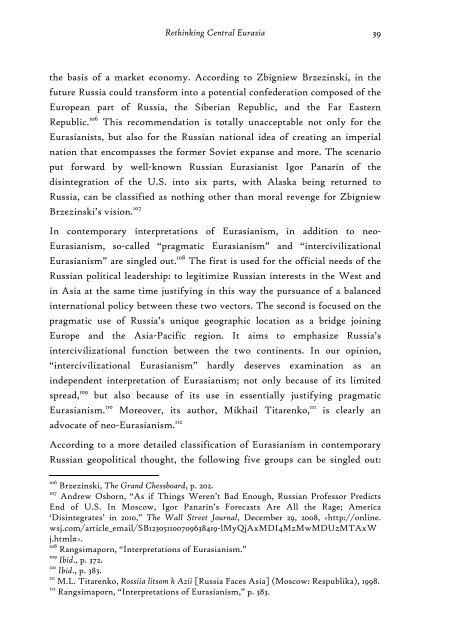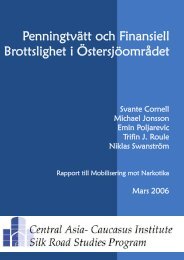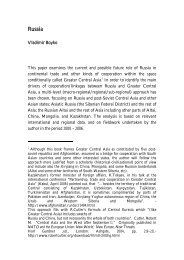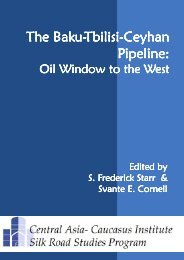Eurasianism and the Concept of Central Caucaso-Asia
Eurasianism and the Concept of Central Caucaso-Asia
Eurasianism and the Concept of Central Caucaso-Asia
Create successful ePaper yourself
Turn your PDF publications into a flip-book with our unique Google optimized e-Paper software.
Rethinking <strong>Central</strong> Eurasia 39<br />
<strong>the</strong> basis <strong>of</strong> a market economy. According to Zbigniew Brzezinski, in <strong>the</strong><br />
future Russia could transform into a potential confederation composed <strong>of</strong> <strong>the</strong><br />
European part <strong>of</strong> Russia, <strong>the</strong> Siberian Republic, <strong>and</strong> <strong>the</strong> Far Eastern<br />
Republic. 106 This recommendation is totally unacceptable not only for <strong>the</strong><br />
Eurasianists, but also for <strong>the</strong> Russian national idea <strong>of</strong> creating an imperial<br />
nation that encompasses <strong>the</strong> former Soviet expanse <strong>and</strong> more. The scenario<br />
put forward by well-known Russian Eurasianist Igor Panarin <strong>of</strong> <strong>the</strong><br />
disintegration <strong>of</strong> <strong>the</strong> U.S. into six parts, with Alaska being returned to<br />
Russia, can be classified as nothing o<strong>the</strong>r than moral revenge for Zbigniew<br />
Brzezinski’s vision. 107<br />
In contemporary interpretations <strong>of</strong> <strong>Eurasianism</strong>, in addition to neo-<br />
<strong>Eurasianism</strong>, so-called “pragmatic <strong>Eurasianism</strong>” <strong>and</strong> “intercivilizational<br />
<strong>Eurasianism</strong>” are singled out. 108 The first is used for <strong>the</strong> <strong>of</strong>ficial needs <strong>of</strong> <strong>the</strong><br />
Russian political leadership: to legitimize Russian interests in <strong>the</strong> West <strong>and</strong><br />
in <strong>Asia</strong> at <strong>the</strong> same time justifying in this way <strong>the</strong> pursuance <strong>of</strong> a balanced<br />
international policy between <strong>the</strong>se two vectors. The second is focused on <strong>the</strong><br />
pragmatic use <strong>of</strong> Russia’s unique geographic location as a bridge joining<br />
Europe <strong>and</strong> <strong>the</strong> <strong>Asia</strong>-Pacific region. It aims to emphasize Russia’s<br />
intercivilizational function between <strong>the</strong> two continents. In our opinion,<br />
“intercivilizational <strong>Eurasianism</strong>” hardly deserves examination as an<br />
independent interpretation <strong>of</strong> <strong>Eurasianism</strong>; not only because <strong>of</strong> its limited<br />
spread, 109 but also because <strong>of</strong> its use in essentially justifying pragmatic<br />
<strong>Eurasianism</strong>. 110 Moreover, its author, Mikhail Titarenko, 111 is clearly an<br />
advocate <strong>of</strong> neo-<strong>Eurasianism</strong>. 112<br />
According to a more detailed classification <strong>of</strong> <strong>Eurasianism</strong> in contemporary<br />
Russian geopolitical thought, <strong>the</strong> following five groups can be singled out:<br />
106<br />
Brzezinski, The Gr<strong>and</strong> Chessboard, p. 202.<br />
107<br />
Andrew Osborn, “As if Things Weren’t Bad Enough, Russian Pr<strong>of</strong>essor Predicts<br />
End <strong>of</strong> U.S. In Moscow, Igor Panarin’s Forecasts Are All <strong>the</strong> Rage; America<br />
‘Disintegrates’ in 2010,” The Wall Street Journal, December 29, 2008, .<br />
108<br />
Rangsimaporn, “Interpretations <strong>of</strong> <strong>Eurasianism</strong>.”<br />
109<br />
Ibid., p. 372.<br />
110<br />
Ibid., p. 383.<br />
111<br />
M.L. Titarenko, Rossiia litsom k Azii [Russia Faces <strong>Asia</strong>] (Moscow: Respublika), 1998.<br />
112<br />
Rangsimaporn, “Interpretations <strong>of</strong> <strong>Eurasianism</strong>,” p. 383.






